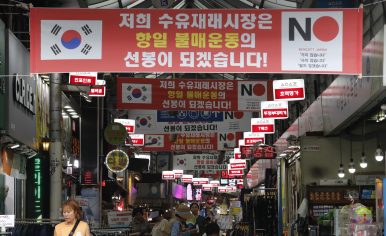By Ankit Panda
In August, Japan and South Korea both upped the ante in their intensifying trade dispute. Japan made good on its threat to remove South Korea from a “white list” of trusted export destinations, meaning extra hoops to jump through for the export of sensitive technologies to its neighbor. South Korea responded in kind, removing Japan from its own “white list.”
Tokyo has repeatedly claimed that the new trade restrictions are the result of concerns over South Korean export controls, which Japan insists could let sensitive materials cross into North Korea or China. But many believe the restrictions are the result of a far more toxic brew of nationalism and historical issues, which is being reciprocated in South Korea.
To help sort through the root causes of today’s dispute, The Diplomat’s Ankit Panda spoke to James L. Schoff, a senior fellow in the Carnegie Asia Program. In the following conversation, Schoff explains 2019’s trade tensions in light of longstanding fractures in the Japan-South Korea relationship, and what that legacy means for 21st century geopolitics.
How much is the ongoing dispute really being driven by historical issues? Japan has sought to convince the international community that its decision to impose export controls was driven by legitimate national security concerns. Is that just a pretext to address other grievances?
In the first few days after the Japanese government announced its export control review (and imposed new requirements for three products in early July), Tokyo gave vague and conflicting accounts of what prompted the move. Since then, the government has been adamant that the export control decision is totally separate from ongoing historical disputes. This claim is hard to accept at face value.
The fact that the Japanese government is not actively trying to work with Seoul to address any specific concerns about South Korea’s export control processes tells me that the reason Japan downgraded South Korea to a second tier status was Tokyo’s depleted trust in the Moon administration overall. From the Abe government’s perspective, the only way that South Korea can get back on the export control “white list” is if it works to improve the wider political relationship with Japan, which includes the history issues.
This trust has been eroding steadily since last year, notably from Moon’s decision to abandon their bilateral agreement on “comfort women” and accompanying foundation; an incident at sea when a South Korean naval vessel pointed its fire-control radar at a Japanese Self-Defense Forces plane; an inability to resolve other disputes involving imports of Japanese seafood; and Korean Supreme Court decisions that order some Japanese companies to pay victims (and family members) of Japan’s forced labor practices during the colonial period and World War II.
Seoul tends to view Japan’s export control action as retaliation for the Supreme Court decisions in particular, but that is probably just one factor of many. Japan’s move to downgrade South Korea as a privileged economic partner reflects a broader disillusionment and loss of trust that flows in part from Tokyo’s dissatisfaction with the way the Moon government has handled sensitive history issues, but it also involves other disagreements regarding North Korea policy, territorial disputes, and how to balance against China’s rise — including protection against technology “leakage” to Chinese firms.

No comments:
Post a Comment